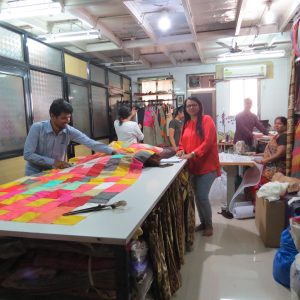Bhavini Parikh’s start-up Bunko Junko creates trendy statement pieces with upcycled fabrics and waste generated by the fashion industry, Paromita Pain writes
 A Bunko Junko product is distinct. Its bright colours, modern designs and upcycled materials are a testimony to founder Bhavini Parikh’s zeal for social entrepreneurship and sustainable fashion. “We design, deconstruct and develop exclusive garments using industrial waste, dead stocks and sustainable material,” she says. “Every product has its own story, and no two products are the same.”
A Bunko Junko product is distinct. Its bright colours, modern designs and upcycled materials are a testimony to founder Bhavini Parikh’s zeal for social entrepreneurship and sustainable fashion. “We design, deconstruct and develop exclusive garments using industrial waste, dead stocks and sustainable material,” she says. “Every product has its own story, and no two products are the same.”
Parikh, a textile artist and fashion designer, is the founder and creative director of Bunko Junko and the Dezine Life Social Welfare Foundation. Through both organisations, she has provided employment to nearly 1,000 women from rural areas.
Parikh was part of the U.S. Consulate General Chennai-funded Women in Indian Social Entrepreneurship Network (WISEN) programme, which helps women social entrepreneurs build managerial and leadership skills to scale up their ventures.
Being waste conscious
Parikh was interested in fashion and used to design for several well-known brands. “Those years provided me with a lot of knowledge,” she says. “I was inspired to learn more and research ways to change the industry.” She also learnt that the industry generates a large amount of waste. “Nearly 15 percent of the fabric of any garment directly goes to landfills,” she explains. “Sometimes that percentage is much higher.”
Parikh then started Bunko Junko in 2018—“Bunko” means art, decoration or creation in Japanese and “Junko” comes from the word junk. Since its inception, her start-up has processed more than 36 tons of waste and commercialized more than 250 products. As Parikh says, “Our stylish clothes were once scraps on the factory floor.”
The concept of sustainability is an integral part of the design and production processes—the clothes are comfortable, utilitarian and made with upcycled materials, and they try to work with a zero-waste policy during production. “Everything from post-production is put back into use through patchwork, knitting of back fabrics and making accessories,” says Parikh. “Upcycling allows for the reduction of waste and promotes a more sustainable approach to fashion by extending the lifespan of existing items.”
A community effort
“These are made by underprivileged women from villages, rescue homes, shelters and juvenile centres to help generate livelihood and integrate them into society,” says Parikh. The contribution of these women to Bunko Junko is significant. “They are an integral part of the brand’s supply chain, utilising their skills to produce garments and accessories,” says Parikh. “Their craftsmanship and creativity play a vital role in the production process, adding a unique touch to the upcycled designs.”
“It’s not just work,” says Salma Rizwan. “It’s an opportunity to showcase my creativity and be a part of something meaningful.”
Bunko Junko also provides the women a platform to showcase traditional craftsmanship and connect with wider audiences.
Being a part of WISEN “provided wonderful networking, partnerships, collaborations and knowledge-sharing opportunities,” says Parikh. “Bunko Junko benefited from the expertise, guidance and support of these networks, enabling them to enhance our impact.”
The specialised workshops, capacity-building sessions and mentorship programmes helped Bunko Junko enhance business strategies, strengthen operations and stay updated with industry trends. “This enhanced our visibility and reputation,” says Parikh. “The support and recognition received from WISEN can help Bunko Junko gain credibility, and attract potential customers and partners.”
Parikh plans to expand Bunko Junko’s corporate gifting division to empower more individuals and create a larger environmental impact. “Our environmental impact assessment and reduction strategies need more solidifying,” she says. “Besides, we need to establish more transparent impact measurement systems to track social and environmental benefits.”
(Photographs courtesy Bhavini Parikh)
SPAN-TWF
Trans World Features
(Credit to author and TWF mandatory)



